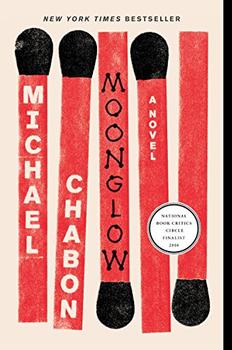Summary | Excerpt | Reviews | Beyond the Book | Readalikes | Genres & Themes | Author Bio

Chapter 1
This is how I heard the story. When Alger Hiss got out of prison, he had a hard time finding a job. He was a graduate of Harvard Law School, had clerked for Oliver Wendell Holmes and helped charter the United Nations, yet he was also a convicted perjurer and notorious as a tool of international communism. He had published a memoir, but it was dull stuff and no one wanted to read it. His wife had left him. He was broke and hopeless. In the end one of his remaining friends took pity on the bastard and pulled a string. Hiss was hired by a New York firm that manufactured and sold a kind of fancy barrette made from loops of piano wire. Feathercombs, Inc., had gotten off to a good start but had come under attack from a bigger competitor that copied its designs, infringed on its trade-marks, and undercut its pricing. Sales had dwindled. Payroll was tight. In order to make room for Hiss, somebody had to be let go.
In an account of my grandfather's arrest, in the Daily News for May 25, 1957, he is described by an unnamed coworker as "the quiet type." To his fellow salesmen at Feathercombs, he was a homburg on the coat rack in the corner. He was the hardest- working but least effective member of the Feathercombs sales force. On his lunch breaks he holed up with a sandwich and the latest issue of Sky and Telescope or Aviation Week. It was known that he drove a Crosley, had a foreign- born wife and a teenage daughter and lived with them somewhere in deepest Bergen County. Before the day of his arrest, my grandfather had distinguished himself to his coworkers only twice. During Game 5 of the 1956 World Series, when the office radio failed, my grandfather had repaired it with a vacuum tube prized from the interior of the telephone switchboard. And a Feathercombs copywriter reported once bumping into my grandfather at the Paper Mill Play-house in Millburn, where the foreign wife was, of all things, star-ring as Serafina in The Rose Tattoo. Beyond this nobody knew much about my grandfather, and that seemed to be the way he preferred it. People had long since given up trying to engage him in conversation. He had been known to smile but not to laugh. If he held political opinions—if he held opinions of any kind—they remained a mystery around the offices of Feathercombs, Inc. It was felt he could be fired without damage to morale.
Shortly after nine o'clock on the morning of the twenty-fourth, the president of Feathercombs heard a disturbance outside his office, where a quick- witted girl had been positioned to filter out creditors and tax inspectors. A male voice spoke with urgency that scaled rapidly to anger. The intercom on the president's desk buzzed and buzzed again. He heard a chime of glass breaking. It sounded like a telephone when you slammed down the receiver. Before the president could rise from his chair to see what the matter was, my grand-father muscled into the room. He brandished a black handset (in those days a blunt instrument) that trailed three feet of frayed cord.
Back in the late 1930s, when he wasn't hustling pool, my grandfather had put himself through four years at Drexel Tech by delivering pianos for Wanamaker's department store. His shoulders spanned the doorway. His kinky hair, escaped from its daily paste- down of Brylcreem, wobbled atop his head. His face was so flushed with blood that he looked sunburned. "I never saw anyone so angry," an eyewitness told the News. "You could almost smell smoke coming off him."
For his part, the president of Feathercombs was astonished to discover that he had approved the firing of a maniac. "What's this about?" he said.
It was a pointless question, and my grandfather disdained to answer it; he was opposed to stating the obvious. Most of the questions people asked you, he felt, were there to fill up dead space, curtail your movements, divert your energy and attention. Anyway, my grandfather and his emotions were never really on speaking terms. He took hold of the frayed end of the telephone cord. He wound it twice around his left hand.
From Moonglow by Michael Chabon. Copyright 2016 Michael Chabon. Excerpted by permission of HarperCollins Publishers.
Your guide toexceptional books
BookBrowse seeks out and recommends the best in contemporary fiction and nonfiction—books that not only engage and entertain but also deepen our understanding of ourselves and the world around us.